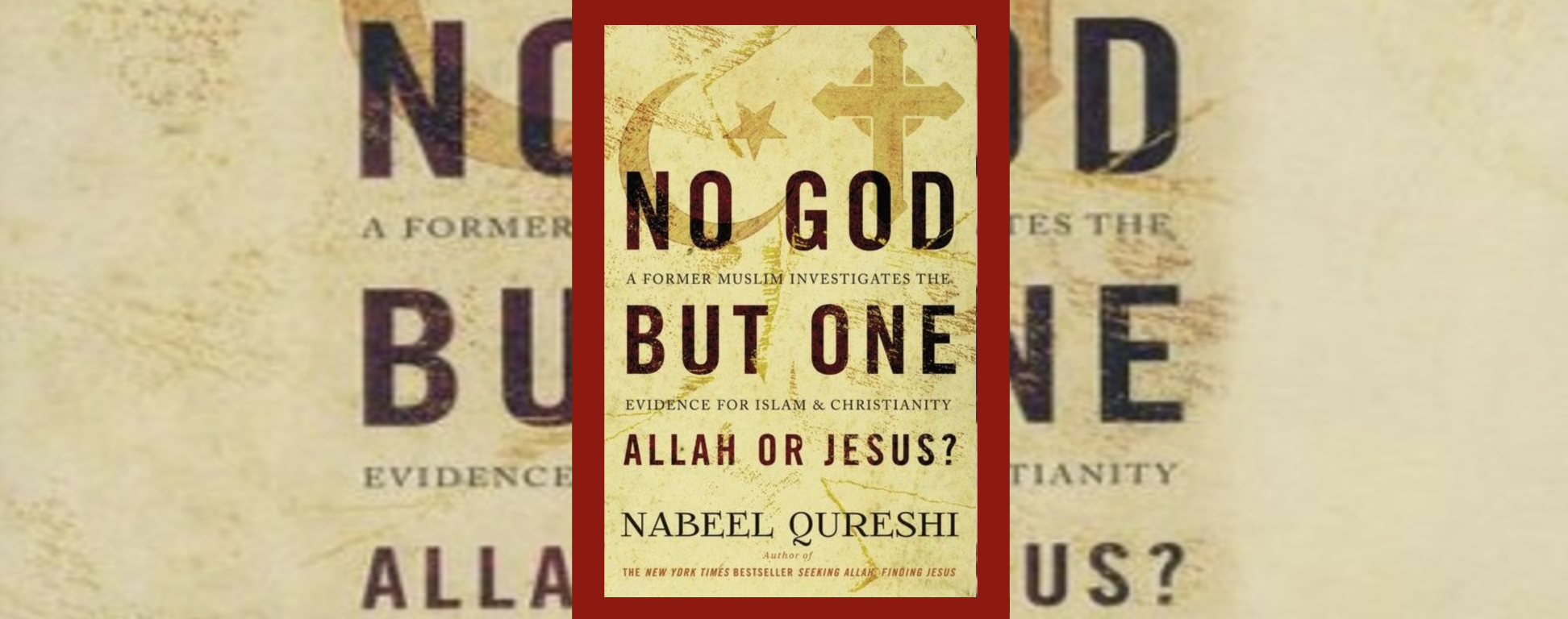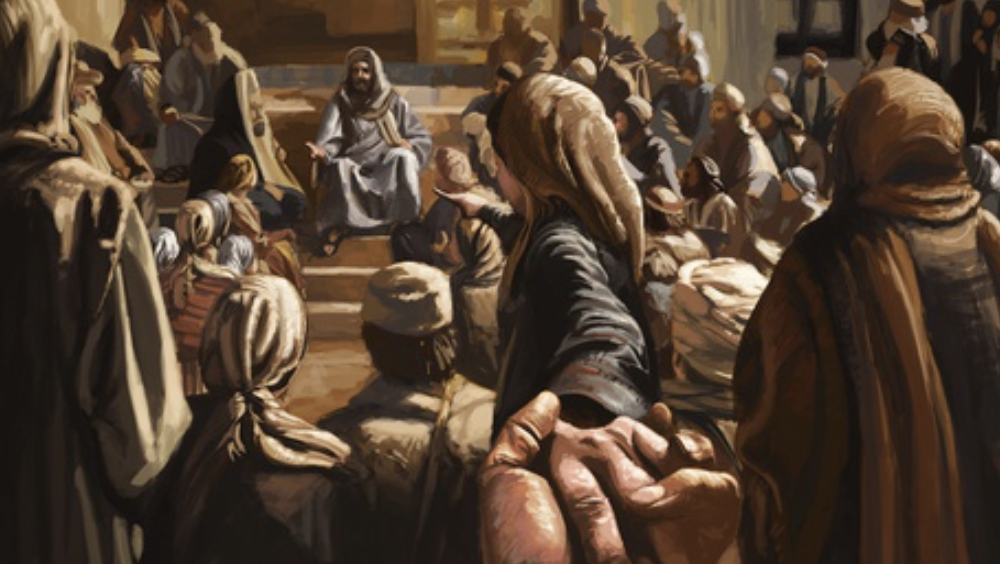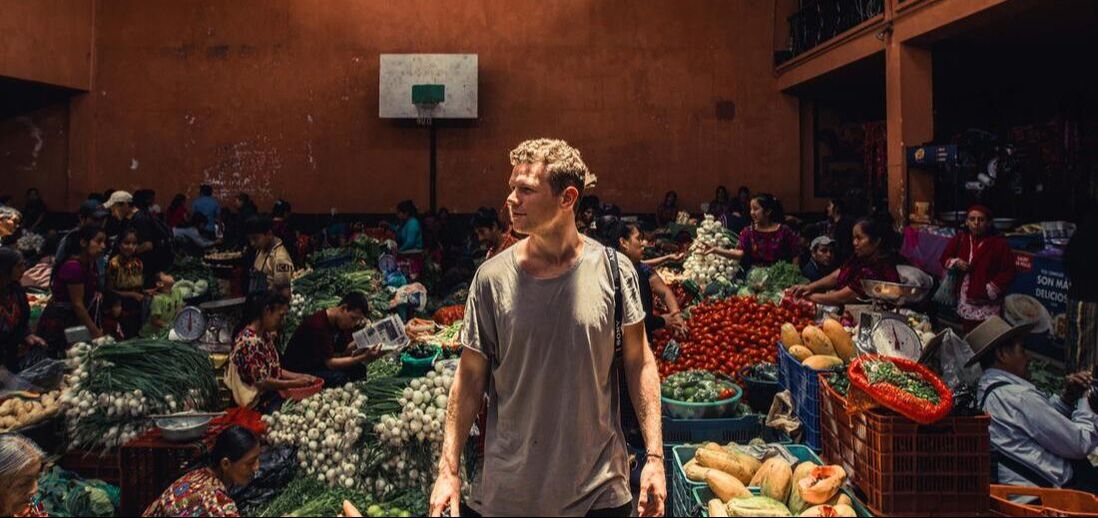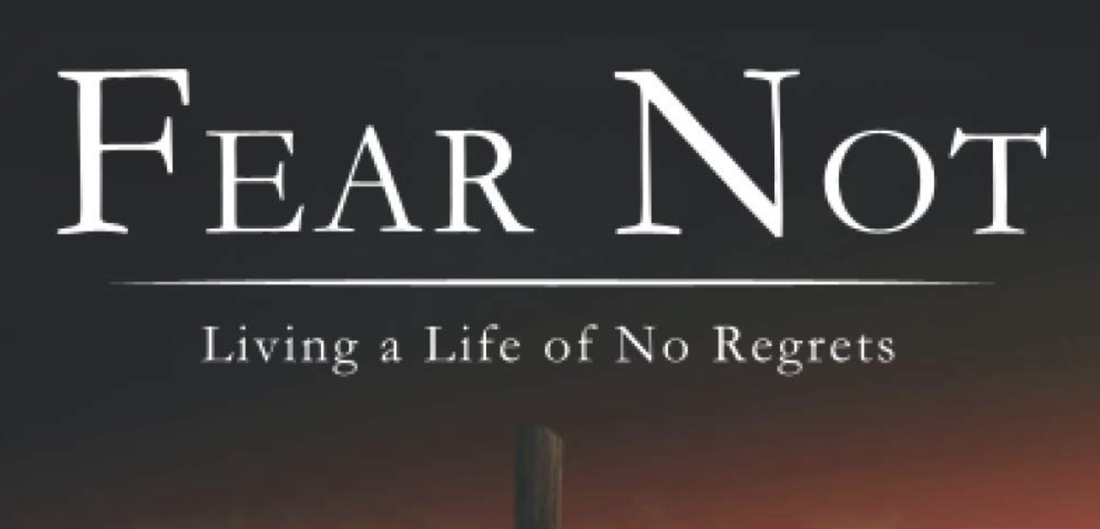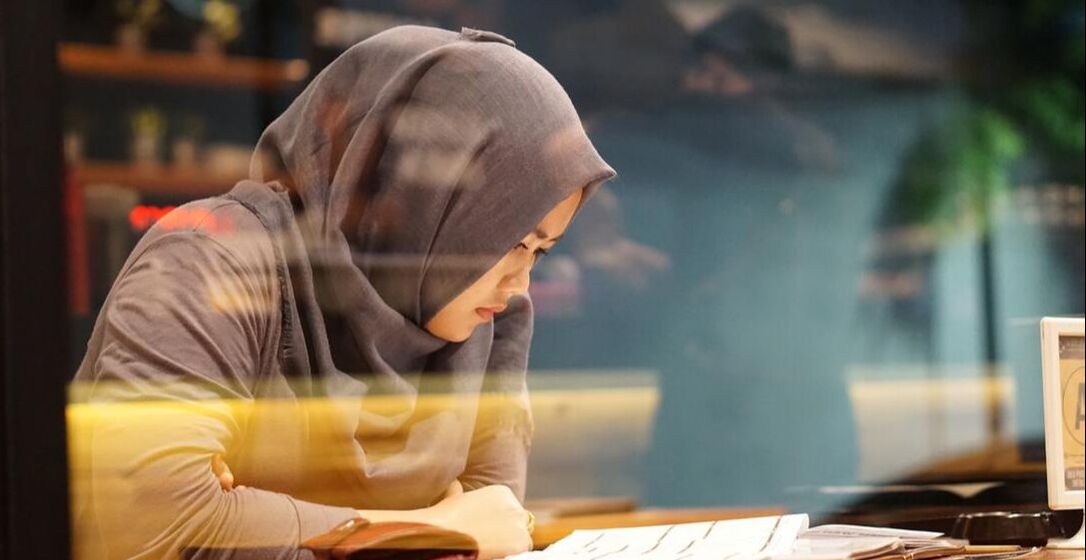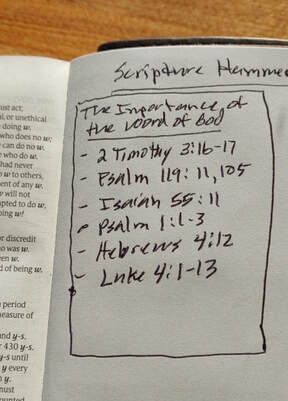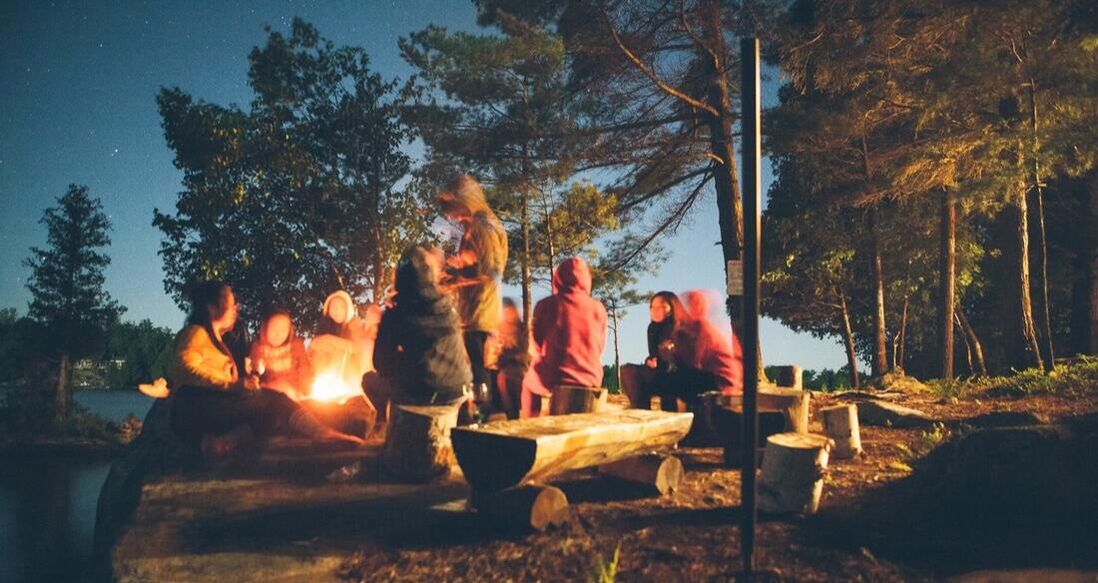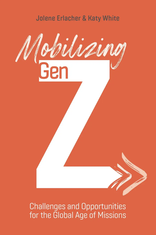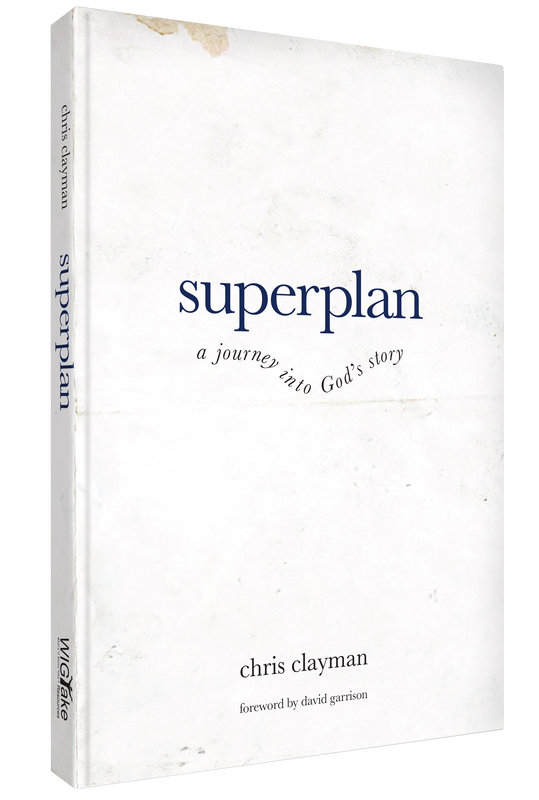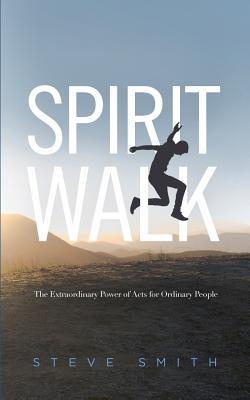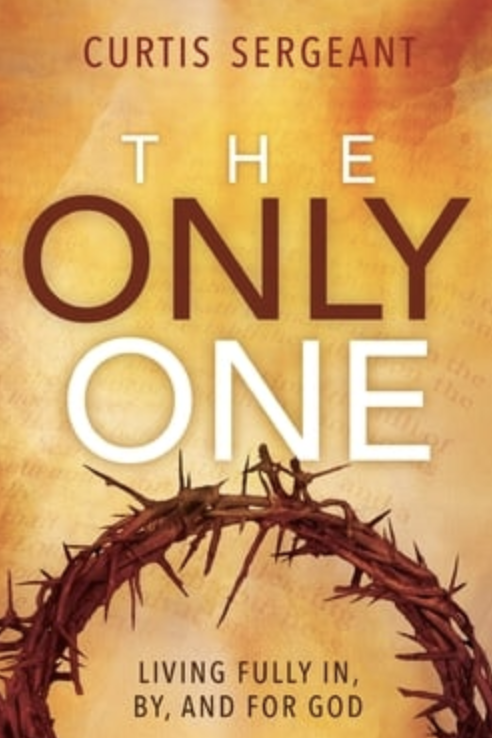|
“I can’t see anything dad.” My seven year old son squeezed my hand ever tighter as we both recognized the obvious truth of his statement. He and I along with my wife and five year old daughter had scrambled up the canyon wall in the Cappadocia region of central Turkey where we were hiking and had climbed into the entrance of a man made cave, a tunnel actually, that angled back into the cliff face and into what we knew from our guidebook was probably a complex of tunnels and rooms; the ancient homes of an ancient people. We had walked the sandy path for nearly twenty yards when we came to a right hand turn. The tunnel was four feet across and just over five feet tall, a rectangular shaft cut straight and true. A few steps into our right turn and we had run out of light. There was a shadowed outline of what appeared to be another tunnel or perhaps a doorway a few feet further into the gloom but beyond that we could see nothing. Darkness stretched out before us. I crouched to rest my bent back and together we discussed our options. We had taken a tour of an amazing underground city the day before which had ignited the flames of our inner explorers. Unfortunately, while none of us wanted to turn back, we didn’t have a flashlight. The flip phone I had at the time didn’t have a flashlight and the gray green glow of its one inch square screen gave barely enough light to see our hands in front of our faces. What we did have was our compact digital camera which had a flash. It was worth a try and so I pointed the camera into the smothering darkness and took a picture. In an instant the tunnel burst into light and just as quickly receded back into darkness. In that moment however we had seen a vision of the future; there wasn’t just one doorway on the left, there were three evenly spaced entrances off of the main tunnel we were in, a tunnel which disappeared ahead in a distant darkness. Dragging my hand along the wall, we made our way into the darkness until we came to the fist cleft in the sandstone. Another flash and we knew it was the entrance to a small and rather insignificant room. The next was the same but the third entrance led into a room that had a very large and rather deep pit carved into its floor. From our tour the day before we knew this had most likely been used to store grain in ages past, however the possibility of stumbling into one of these deep pits was unnerving. We squatted for another conference, reiterating to the kids to stay together and agreeing to not take any unnecessary risks. We proceeded another thirty yards or so when we noticed light ahead. We made our way forward and found a tunnel returning to the face of the cliff. It was another way out and it brought both relief and courage. We turned back into the darkness and continued to explore. When we ventured deep enough, the light was non-existent and we rarely knew what was beyond the edge of our flash. Ten feet at a time, we wandered this complex of tunnels and rooms, discovering what felt like ancient secrets, including a large room where we imagined the community gathering for meals or worship. Fear and joy mingled as we spent the next hour chasing the light into the darkness. As I read the Biblical stories, it seems that in many ways, faith is the simple act of chasing light into the darkness. When Moses’ mother coated a papyrus basket with tar and pitch she was simply taking the next step of faith. She hadn’t seen the whole story but in faith, she had followed the flash of God’s grace into the darkness. Moses’ sister had only seen a glimpse of a better future but she knew her God and so she took tentative, faith-filled steps into the river where she waited, standing in the shadows, standing in the muck and mire of the river, standing in the light of expectation. Joseph’s dream was followed by a pit and slavery and prison but he held on to hope, trusting that God was working behind the scenes and would remain true. When the twelve disciples watched their risen Lord ascend into heaven, the great commission was still ringing in their ears. Go and make disciples of all nations. The whole world was the vision Jesus had given them and yet they had no budget, no buildings, and no infrastructure to speak of. They did have a promise, that Jesus would be with them until the very end of the age, and they’d spent three years watching Jesus do the work of His kingdom and so they simply moved forward into the next thing God showed them. The story of the book of Acts is the story of the disciples peering down dark tunnels expectantly looking for the light to flash. They lived with a deep trust that God was working and that His kingdom would expand. They knew beyond a shadow of a doubt what they were supposed to do - Go make disciples of all nations - but they didn’t necessarily know how it would get accomplished. They prayed and planned and took daily steps of faith, all the while trusting that God was orchestrating His will. As the disciples took those daily steps of faith, God stepped with them into their context to infuse it with His power in His timing. It is the faithfulness of the disciples that is paramount. The planning was helpful. The strategies were important. But as Andy Stanley points out, “believers with vision live with the knowledge that “how” may come about independently from their planning. But it will not come about apart from their faithfulness. Faithfulness is critical to success.”* This is the pattern I watch weekly in the volunteers who serve in Crescent Project’s Embassy ministry which I help lead. Embassy works to equip followers of Jesus to go into the online spaces where Muslims congregate. There they build rich, lifelong friendships through which they’ll have the opportunity to share the good news of Jesus as they share their lives. Every interaction is an act of faith. The will of the Father is clear - He desires that none should perish so he sent his only begotten son to seek and save the lost and to give His life as a ransom. In Jesus is life and that life is the light for all mankind. While the vision of the Father is clear, how it will actually come about is another question all together. Meaningful scriptures shared with Muslim friends are met with smug comments that give no hint of interest in the gospel. Honest probing questions are deflected and avoided. For many of our volunteers it can be a long, bent-backed slog through tunnels of darkness as Muslim friends respond with seeming indifference. And yet as we look to the scriptures we find hope that the Father is drawing people to Christ. He is at work behind the scenes whether we realize it or not. Seeds are planted which the Holy Spirit will water in His time. This truth was highlighted in the story of a young lady from Central Asia. One of our Embassy volunteers had been laboring for nearly two years, meeting only indifference and the needy immaturity of a nineteen year old teen wanting to learn English even as she became a sort of surrogate aunt for this young lady. But then Covid-19 spread across the globe carrying in its wake a growing sense of anxiety and fear. This young lady was swept into a dark tunnel of despair and insomnia. And then suddenly a light flashed in her heart as the prayer of our volunteer struck a nerve. A prayer in Jesus' name broke down a door of insomnia. A prayer in Jesus’ name brought a bright calm into a heart swirling in the darkness of increasing anxiety. An invitation to read the scriptures was hesitantly accepted and a few months later this young lady placed her trust in Jesus. The blinders fell off and she stepped into the light. It is a truth that you can can almost certainly trace back through your own journey of faith. Someone took a risk to share with you. Someone stepped through their fear to point you to the truth. Something happened that in the moment seemed like disaster. Faith always requires the active pursuit of light into darkness. The writer of Hebrews reminds us that “faith is confidence in what we hope for and assurance about what we do not see”. We rarely know what lies on the other side of the darkness, but as we take steps of faith, as we move forward in prayer and hope, as we step into the light - even the dim flashes born of our weak faith - God shows up. * This quote is from Andy Stanley's book, Visioneering: Your guide for discovering and maintaining personal vision (2016). Multnomah Publishers. (pg. 58) Learn more about Crescent Project and Embassy. image credit Did you find this article helpful? Share it with a friend.
0 Comments
If you have been involved in ministry to Muslims for more than a few months, you’ve undoubtedly heard of Nabeel Qureshi. His journey from devoted Muslim to apologist for the Christian faith was masterfully documented in his New York Times best selling book Seeking Allah, Finding Jesus. His dedication to pursuing and proclaiming the truth with grace and humility shows up in his hundreds of talks, interviews and debates which can be accessed with a simple search on Youtube. His writing is generous, never belittling the Muslim worldview but giving it a fair response as he did so well in his short book Answering Jihad. Nabeel sadly was diagnosed with advanced stomach cancer in 2016 and died a year later at the age of 34. C. S. Lewis famously said that, “Those of us who have been true readers all our life seldom fully realize the enormous extension of our being which we owe to authors.” The psalmist exhorts us to “Sing of the Lord’s great love forever; with my mouth I will make your faithfulness known through all generations (89:1).” One of the gifts that thinkers and writers like Qureshi leave to all generations is the gift of their books. No God But One: Allah or Jesus? is one of those important books that will indeed be a gift to generations of Christians as it makes His faithfulness known. “No God But One: Allah or Jesus? addresses the most important questions at the interface of Islam and Christianity: How do the two religions differ? Are the differences significant? Can we be confident that either Christianity or Islam is true? And most important, is it worth sacrificing everything for the truth?” With a description like the one above, I came to this book expecting an academic tome, something created for the intellectual heights of academia or those dedicated missiologists who read everything they can get their hands on. I was therefore pleasantly surprised to find that Nabeel's voice in the book had stayed true to his voice in both of his other books: winsome, accessible, narrative and generous. I think this highlights one of Qureshi’s greatest gifts to the church: His ability to speak with authority and deep knowledge about complicated and complex topics in ways that we can all understand. He is engaging without being flippant, compelling without being preachy and committed to the truth without being pedantic. No God But One: Allah or Jesus? Is written in two main sections which each explore two important questions through five different parts. The two questions are:
With these questions framing up the discussion, Nabeel makes a rock solid case for the claims of the Biblical understanding of Jesus and graciously pulls apart the Islamic arguments both for Islam and against Christianity. At nearly 300 pages, this is an in depth study of the topic. Just about everything a person has heard or wondered about Islam is covered. A few years ago I was sharing with a group of high school students who were reading Kate McCord’s book, In the Land of Blue Burqas. Most of them were not interested in ministry to Muslims but all of them felt that they had grown in their understanding of the God of the Bible because for the first time, they’d seen their God side by side by the god of the Quran. The distinctions they were sensing brought about a deeper understanding of and appreciation for the God they worship. With No God But One: Allah or Jesus?, Nabeel Qureshi gives readers a chance not only to learn about Islam, but in so doing, he invites readers to grow in their own understanding of and appreciation for the God they serve. Because of this, I want to encourage everyone who follows Christ to read this powerful book. * links to books are affiliate links Did you find this post helpful? Share it with a friend. In Curtis Sergeant's book, The Only One, he suggests the discipline of writing poetry as part of our Bible reading. "Poetry is by nature a limiting form of expression. I find that it forces me to think deeply as I search for just the right word to convey the nuance I am contemplating." As I have immersed myself in the first few chapters of John these past few weeks I decided to give it a try and tease out the nuances of what I've been contemplating. It was a rich experience and forced me to wrestle with what I feel the Lord has been highlighting for me. Writing poems from my Bible reading won't become a daily discipline, but I'll certainly come back to it when I come across a passage of scripture that I really want to dig into. I'd encourage you to give it a try sometime. Here is my poem, "Come and See" that I wrote as I dug deep into John 1:29-51. It may not be great poetry but it certainly helped me meditate and learn from this passage of scripture.
I wrote about the idea of inviting people to come and see for themselves in last week's post, Come and See. You can read it HERE. Did you find this post helpful? Share it with a friend. In the first few chapters of John an interesting pattern emerges. The numbers of those following Jesus begins to grow as his followers simply invite their friends, family or, in the case of the woman at the well, entire village to "come and see."
To be sure, none of those activities are wrong and God uses all of them to help people come to faith - they are simply not the example of Jesus' first followers in the first four chapters of John (John 1:39; 1:41-42; 1:45-46; 4:28-30). For them, "come and see" was enough. It seems they knew that if they could just get their friend to spend some time with Jesus - even a cynic like Nathanael - that would be enough. And Jesus is still enough today. Like his first followers, we can ask our friends to come and see Jesus by sharing the stories of Jesus from the gospels and by inviting them to read these stories. We can do this by inviting them read through one of the gospels with us or we can invite them to into a discovery Bible study using one of several story sets:
My default has been to invite people to church or to open up deep philosophical conversations with my far from God friends. God has of course used both of these tactics, but increasingly I'm learning (and trying to learn) to default to simply asking them to come and see Jesus for themselves by inviting them to read the gospels with me. How about you? How have you been inviting people to Jesus lately? Did you find this post helpful? Share it with a friend. One of the great challenges we face as Christians in an increasingly globalized world is understanding how to share the love of Jesus and the good news of the gospel cross culturally. As if language barriers were not enough, deep cultural differences in worldview, in customs, in values and history all have the potential to create barriers to good communication and open up wide avenues for miscommunication. Debbie DiGennaro, in her book Acclicmated to Africa: Cultural Competence for Westerners, shares a humorous story that highlights this challenge: There was once a certain British man who went with his company to Nigeria. He immediately noticed about Nigerians that the men did not step back to allow ladies to enter a room ahead of them. This bothered him very much. As a proper gentleman, whenever he approached a doorway at the same time as a Nigerian woman, he courteously motioned for her to pass through the door ahead of him. It is not hard to imagine why, in a country where for thousands of years families most likely lived in grass huts with snakes being an ever present issue, the custom of how to enter buildings developed differently than it did in England. It's also not hard to imagine the looks of confusion and even disdain this British gentleman must have received from Nigerian women as he emphatically ushered them into their potential death by snake bite. This cultural nugget of difference is multiplied thousands of times with every new cultural context we enter. Some issues are minor while others can lead to tremendous damage to relationships and potential opportunities to share the gospel. As disciples of Jesus it is important to first realize that those differences, both the deep and the shallow, will always be present when we move into cross cultural settings. We then must do the hard work of trying to understand these differences to see where God is already at work and how we can join him there. This is hard work. Just when we think we’ve figured something out we’ll run into nuances that will confound us once again. If cross cultural ministry is something that you are or will be a part of then it is vitally important to do some homework. Cross cultural ministry can happen in varying degrees wherever you are. Crossing the ocean to engage with people from a different religious background that speak another language is of course more complex than a midwesterner traveling to New York City, but both are cross cultural ministry. Regardless of the complexity and depth of difference between cultures, we can train ourselves to do better at recognizing both the differences and the opportunities they present. Part of that training could be reading books like Foreign to Familiar by Sarah Lanier or Global Humility by Andy McCullough. Context specific books like the one shared above can be a next step. There are also great trainings for missionaries preparing to move overseas at places like Mission Training International and the Center for Intercultural Training. Here at Everywhere to Everywhere though we are working to equip and empower the local church for local cross cultural ministry and so have created a fun and interactive one day training we call the Cross-Cultural Scavenger Hunt Training Module. This training can be done in any local city in about 5-6 hours. It includes discovery Bible study, interactive lecture and activities, lunch at an ethnic restaurant and a cross-cultural scavenger hunt that takes participants to three to four different immigrant-owned grocery stores. All of this is followed by a debrief while eating snacks purchased at the stores. This has been an amazing way to help local congregations move past fear and begin to get to know their new American neighbors - many of whom come from Muslim, Hindu, Buddhist or Animistic backgrounds. Many of whom have never had an opportunity to hear the gospel. The goal of the training is to bring awareness of the different cultures around us and then give participants a beginning framework for understanding the differences so that they can more effectively love well and share the gospel more confidently. If you would like to explore hosting your own Cross Cultural Scavenger Hunt Training Module you can find a fuller description of the event and all the necessary resources by clicking the button below. Did you find this post helpful? Share it with a friend. 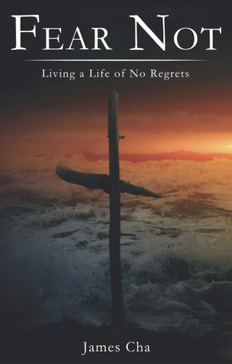 Sometimes you need a book that, through reading a chapter a day, you receive encouragement in your faith. Fear Not: Living a Life of No Regrets was just that book for me this past summer. Author James Cha weaves captivating stories, Biblical truth and a lifetime of wisdom into this great devotional. James and his wife Faith spent over a decade serving the Lord in Central Asia, saw more than 120 Muslims come to faith in Christ and experienced their own share of persecution. It is because of these experiences and James' deep knowledge of the Bible that Fear Not is an excellent resources for any believer wanting to grow in their faith. It will be an especially helpful resources for any interested in moving to the Muslim world to serve the Lord. The book covers a myriad of topics all of which work toward helping the reader to respond to the call of Christ in obedience and surrender. It was incredibly encouraging, filled with exhortation and I would recommend it to anyone who wants to grow closer to Christ and learn to be a more active participant in His kingdom mission. Fear Not: Living a Life of No Regrets *Links to book are affiliate links. UPG North America is a great new website to help the local church engage the unreached people groups who are moving into the neighborhoods of North America. It is the collective work of multiple organizations with the shared desire to "serve the entire Body of Christ in our common goal of communicating the love of Christ to all peoples of the world."
The website exists to identify the least-reached diaspora communities in North America, mobilize prayer for them, and see an increase in gospel activity among them. A few of the unique aspects of the site are an interactive point of interest maps and virtual prayerwalks for specific people groups in a city. This website is a great new tool for anyone interested in sharing the love of Jesus with the least reached in North America. Visit now: www.upgnorthamerica.com If you have had the opportunity to listen to more than a few testimonies of people who were raised in lostness and came to faith, you have probably started to notice a couple of themes. One of those themes is the importance of a follower of Christ in their life. They met a Christian who through word or deed or both had an impact on their journey toward faith. Another that often comes up is the power of the word of God to bring conviction and give hope. In reading the Bible, they met a God who loved them enough to send his one an only son to save them from their sin, from fear and shame and from death.
In the scriptures, they met the living God. With this article, I want to provide tools to help you help your friends begin to explore the Bible and learn from the scriptures themselves. The Bible is both the greatest evangelistic tool that we have as well as the foundation for disciple making. Story Sets are apowerful tool to help your friends read the Bible. Story Sets A story set is a set of Bible stories that focus on a particular topic or theme. These can be used as a basis for exploring the Bible with your friend. Story sets are most often narrative in nature which allows pre-believers to enter into the story of the Bible and into discussion with you around the character and will of God. The purpose of story sets is to get people quickly into the scriptures, and to begin to teach them how to read the word of God. How To Use Story Sets As you connect with people who are far from God or if you are working with new believers, it will be natural to talk about the things that are important to our lives. There will be events in life that you will want to celebrate with your friends. There will be challenges in life that come up for which your friends will be looking for guidance. You will find yourself talking about the bigger questions of the meaning of life and the nature of God. Story sets give us a framework for introducing the word of God into these discussions. For example, let's say you are having a conversation with a young mother and she says, “I got into parenting before I was ready. Other people make it sound so easy. My mother just laughs. My grandmother says everything will be okay. But I’m trying to raise my kids without a map. Please help.” You could respond, “I’ve found a lot of guidance for parenting in the word of God. I’ve been so thankful that God gives us examples of parenting in the Bible. I wonder if you would like to read some of these stories together and see what we can learn from them.” You could then find or create a story set and read through a story each time you meet. Here is an example of a "New Parent" story set:
This particular story set finishes out by pointing not just to some good examples and lessons for parents, but with the story of Abraham and then the return of the prodigal son. Like this one, most story sets are evangelistic in nature, giving guidance for life while also pointing to Christ. One of the most commonly read story sets in the Muslim, Hindu and Buddhist world is Creation to Christ, a collection of stories, starting in Genesis, that give a general overview of the story of the whole Bible. Choosing The Right Stories How do we know which story set is the right story set to read with each of my friends? This is a discernment process that begins with prayer. Pray often for the opportunity to read the Bible with your friend. Pray for wisdom to know what stories in the Bible are the ones that will meet the felt needs of our friends and meet them where they are at. Choosing a story set also involves good listening. If we care about our friends, then we will be asking about their lives and as we get to know them, we’ll begin to hear the issues with which they are struggling. Then we can create or find an appropriate collection of Bible stories for their particular need. How To Read The Stories Isaiah 55:11 says, “When my word goes forth, it shall not return empty or void, but will accomplish the thing for which I sent it.” This is an amazing promise and it encapsulates why it is so important that we help our friends begin to read the scriptures. God will do the work! A process to read the Bible that missionaries around the world are finding to be fruitful is the Discovery Bible Study. It is a simple process that allows the Word of God and the Holy Spirit to be the main teachers. You don’t have to have all the answers but can trust that as you read the Bible with your friends, the Holy Spirit will guide them. It also begins the disciple making journey even before they come to faith as you model with them how to read the word of God and apply its teachings to your lives. [Learn more about Discovery Bible Study] The Discovery Process 1. Before you jump into the Bible story, be sure and spend some time connecting with your friend. How are they doing? How are their father and mother doing? How is work going? Spend time being with them. Don’t neglect this opportunity to extend hospitality. Share the week's highs and lows with one another. 2. Next turn to the passage. Read the passage aloud with your friend. Re-read it 3-4 times. Really! Re-reading helps ensure that they are actually getting into the passage. 3. Work together to retell the story in your own words. Don’t explain or interpret. Just retell the story. This provides an opportunity to make sure they are understanding the story and creates an opportunity to hear the story one more time. It also gives you and your friend practice in telling others the story. We want to be able to go home and say to a friend or family member, "Let me tell you the story I learned today." If in the process of your discussion your friend says something that is obviously not in the story, just ask the simple question, “Where do you see that in the passage?” 4. Next begin to discuss the following discovery questions:
5. Work together to think about what you can do this week to apply what you have learned in the passage. It can be helpful to actually write down an “I will . . . “ statement. 6. Spend time thinking about other people in your life who you could tell the story to this week. Ask, “Who can you tell this story to this week?” 7. Last question -- When can we meet again? Set a time to connect again and to read the next passage in the story set. Story Set Collection The following story sets are for you to use with your friends. Most are story sets that others have created and we have collected to share with you here. These should give you an idea of how you could create your own story sets to respond to the felt needs of your friends or disciples. 54 Trial DBS Series The parenting story set above comes from this great resource. I'd originally seen this collection of stories on a website which is no longer active. Thankfully my friend Chuck sent me a copy he received from a friend who was connected with Jerry Trousdale. This is a collection of 54 stores divided into nine major categories with six sets of six stories each. It is a really amazing resource. You can access this story set HERE. Creation to Christ - Long Version Beginning with Genesis, this study examines how God's plan of redemption unfolds throughout the Old Testament. It leaves the reader expectant for the fulfillment of the many prophecies found throughout the scripture. You can access this story set HERE. Creation to Christ - Short Version A modified, shorter version of the original Creation to Christ set. You can access this story set HERE. Stories of Hope A series of seven stories that introduce the reader to Jesus. You can access this story set HERE. Signs of John A series of seven stories that introduce the reader to Jesus. You can access this story set HERE. Learning to Follow Jesus A series of stories that allow you to disciple a new believer into the basics of following Christ. You can access this story set HERE. Other Story Set Resources
I've written often about the importance of immersing ourselves in the word of God and have shared tools for helping us do that well. Today I want to take one step back and share a short scripture hammer tool to help young believers discover the absolute importance the scriptures. The tools are great but if your disciple doesn't understand why they need to apply the tool, well, it may not do much good.
When I sit down to read these with my disciple - or a group of disciples - I read each passage two to three times aloud and then have the individual or the group summarize the basic message in their own words. I save the last passage - Jesus' confrontation with the devil in the wilderness - for last as a way to sort of watch Jesus apply the scriptures in His own life.
The goal is to help our disciples discover the joy, the benefit and the power of the scriptures in our lives. The sooner we can help them begin prayerfully engaging with the scriptures on a daily basis, the quicker they will grow toward maturity. If we really believe that the Holy Spirit will guide us - and them - into all truth (John 16:13) then we have to help them get into the scriptures trusting that the Holy Spirit will indeed disciple them into all truth. Do you have a young believer in your life who is struggling to get into the word daily? Find some time to sit down and work through these scriptures together. Do you have another scripture or story that you would include in the list? Share it in the comments below. Scripture List:
If you do take a disciple through this discovery study, let me know how it went in the comments as well. What is the person of peace? It's a term that is increasingly used both in the church and in the mission field. Practitioners of disciple making movements (DMM) often talk of searching for the person of peace and yet different groups use the term in different ways. All are correct but for those just beginning to explore the idea of the Person of Peace, a clarification might be in order. Some define the Person of Peace (PoP) as anyone who welcomes and opens up their relational network to to the messenger - be that a missionary or a local lay believer crossing the street in their neighborhood. In this use, the PoP doesn't necessarily need to be someone who initially accepts the message, but rather gives permission to the messenger to share with the group. They are often a gatekeeper of sorts - an elder of the village or the patriarch of a family. God is using them to open the door for the message to go forward in their context. This is also sometimes referred to as a House of Peace. A second way the idea of the Person of Peace is used is to simply indicate someone whom God has prepared to receive the gospel. They are a seeker, a God prepared person. Perhaps they've had a dream or a vision or have had a crisis in life that caused them to do some deep soul searching. Their heart is prepared to respond to the gospel. They are ready to receive the messenger and the message. A final way I often hear to idea of the Person of Peace discussed is that they not only are prepared to receive the gospel, but they are also ready and able to reproduce and share the good news with other. They receive the message and the messenger but they also readily receive the mission. When the woman at the well believes Jesus in John 4 she immediately takes that message back to he village where she tells everyone the good news and brings them to Jesus. Many would also refer to this person as a "Fourth Soil Person" who reproduces 30, 60 or 100 times from the Parable of the Sower. All of these definitions work but as you are reading the literature or listening to interviews with practitioners, it is helpful to understand how they are using the term. It was a bit confusing for me the first time I ran into the different ways it was being used. Perhaps there are other ways to think about the Person of Peace. If so, let me know your thoughts in the comments. Until then, I'd encourage you to download this discovery tool to help you learn about the Person of Peace from Jesus' ministry in the gospels. Trainer's notes are included on page three. |
The E2E Community
Categories
All
Good Books
Archives
April 2024
|
Proudly powered by Weebly


